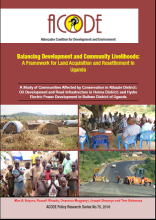Land Library
Welcome to the Land Portal Library. Explore our vast collection of open-access resources (over 74,000) including reports, journal articles, research papers, peer-reviewed publications, legal documents, videos and much more.
/ library resources
Showing items 1 through 9 of 13.A constitutional amendment bill has been tabled before Parliament with the primary aim of overhauling the Constitutional Right to Protection from deprivation of property (Article 26).
The ways in which people obtain land in Uganda are changing fast. Land that used to be secured through inheritance, gifts or proof of long-term occupancy is now more commonly changing hands in the market.
Access to land is at the heart of rural livelihoods. In sub-Saharan Africa, the pace and scale at which land is changing hands are increasing fast.
Land acquisition for development projects by government, private investors and land speculators is a critical source of tensions and conflicts in many parts of Uganda.
The 1995 Constitution of the Republic of Uganda is one of the most gender sensitive constitutions in the world, with clear provisions for promoting and protecting the rights of women.
The constitution and enabling legislation in Uganda, as in many other countries, empower the government to acquire land in the public interest.
The Uganda National Land Policy (NLP) Implementation Action Plan is a deliberate resolution by the Government of Uganda to address major challenges that have hindered the implementation of land reforms, thereby impeding the optimal utilisation of land for socio-economic development and transforma
The Karamoja region in Northeastern Uganda, covering an area of 27,200 square kilometers, is inhabited by around 1.2 million people who live in seven districts; Moroto, Nakapiripirit, Napak, Amudat, Abim, Kotido and Kaabong.
Unfolding analysis reveals two types of land disputes prevalent in postwar northern Uganda: cases that involve a legitimate cause of action and those that do not.1 Since mediation and alternative forms of dispute resolution rely on parties’ willingness to negotiate in good faith, cases featuring







